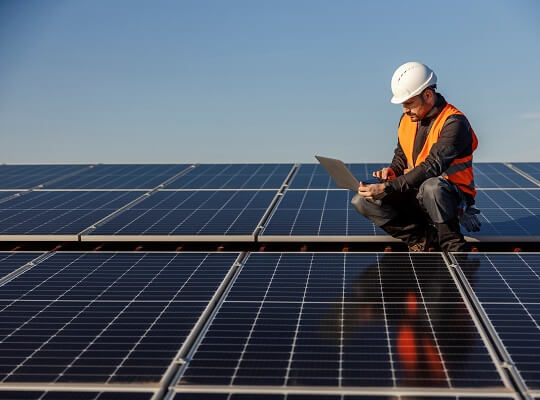How to Select the Right Solar Power Setup for Your Energy Demands
Picking an appropriate solar power installment calls for a systematic technique that begins with a clear understanding of your power usage patterns and awaited future requirements. Elements such as the type of solar modern technology, setup expenses, and available incentives play essential functions in making a notified decision.
Assess Your Energy Demands
Evaluating your energy requires is a vital first action in the solar power installation procedure. Comprehending your current and future energy intake will certainly direct the layout of a reliable solar system customized to your needs.
Consider seasonal variants in power consumption, as certain months might demand more power because of heating or air conditioning needs. Furthermore, examine any scheduled changes in lifestyle or home, such as the acquisition of electric cars or home growths, which might raise your power needs in the future.
When you have an extensive understanding of your energy intake, you can establish the proper solar capacity required to satisfy those demands. This evaluation not only aids in sizing the solar installment yet also informs choices about energy storage options and prospective grid connection requirements. solar photovoltaic. Eventually, properly determining your energy needs guarantees that your solar power system runs efficiently, supplying the benefits of renewable resource abreast with your usage patterns

Evaluate Solar Technology Options
When taking into consideration a solar energy installation, it is vital to review the different solar innovation options readily available to make sure the system aligns with your energy needs and budget plan. The main modern technologies consist of monocrystalline, polycrystalline, and thin-film photovoltaic panels, each offering distinctive benefits and drawbacks.
Monocrystalline panels are recognized for their high performance and performance in restricted area, making them ideal for residential setups with less roofing system area. However, they often tend to be extra expensive. Polycrystalline panels, while somewhat less effective, are generally more economical and can be a good choice for larger installations where space is not a restriction. Thin-film solar panels are light-weight and flexible, ideal for unique surfaces, yet they typically have reduced performance and require even more space to generate the exact same energy outcome.
Along with panel types, consider solar inverters, which transform the straight existing produced by the panels into rotating current for home usage. String inverters, microinverters, and power optimizers each have one-of-a-kind benefits that can influence system performance. Assessing these alternatives will certainly aid you make an educated choice that meets your energy needs successfully.
Consider Installation Costs
Recognizing installation costs is critical for anyone considering a solar energy system. These expenses can differ substantially based on a number of variables, including system dimension, sort of panels, and installation intricacy. A common residential solar setup might vary from $15,000 to $30,000 prior to rewards, which can be a significant upfront financial investment.
To properly evaluate setup expenses, it is important to acquire in-depth quotes from their explanation several solar providers. These quotes should damage down the costs of equipment, labor, allows, and any added accessories required for the setup. Pay very close attention to the quality of materials being used, as higher-quality panels and inverters can result in better efficiency and long life, possibly offsetting higher first prices.
Furthermore, think about the long-lasting implications of installation costs. A more affordable installation may save cash ahead of time yet might bring about higher upkeep prices or lowered energy manufacturing in time. It is likewise advisable to evaluate funding alternatives, such as solar financings or leases, which can affect your total monetary dedication.
Research Study Local Motivations
Checking out local incentives can dramatically affect the overall expense of a solar energy setup. Many areas supply a selection of financial incentives aimed at promoting eco-friendly energy usage, making solar energy much more available and budget-friendly for homeowners and services alike.
These incentives might include government tax debts, state rebates, and local utility firm programs that offer cash money incentives or internet metering alternatives. The Federal Investment Tax Obligation Debt (ITC) permits you to deduct a substantial percent of your solar setup costs from your federal taxes. State-specific rewards can better improve these cost savings, usually in the type of direct cash money rebates or tax obligation credit reports.
In addition, some local federal governments might use home tax exemptions for solar installations, making sure that your financial investment does not raise your real estate tax obligation. Looking into these rewards can uncover substantial financial savings, which can influence your choice check my reference on the dimension and kind of planetary system to install.

Pick a Credible Installer
Choosing a trustworthy installer is essential to guaranteeing the success and long life of your solar power system. The installment process dramatically influences the efficiency and performance of your solar panels, making it imperative to select a service provider with a tried and tested track record.
Next, validate the installer's credentials, including licenses, qualifications, and insurance policy. A respectable installer needs to hold qualifications from acknowledged organizations, such as the North American Board of Certified Power Specialists (NABCEP), showing a high level of competence. Furthermore, inquire regarding the installer's experience with similar projects, particularly in your location, as neighborhood climate and regulations can affect installation practices.
Demand numerous quotes and compare them not just on cost but likewise on click for more info the quality of devices and guarantees supplied. A trustworthy installer must offer clear information about their product or services, helping you make an educated decision. By investing time in selecting a credible installer, you will certainly boost the overall performance and longevity of your solar energy system.
Conclusion
Finally, selecting the proper solar power installment demands a detailed assessment of power requirements, an understanding of offered solar modern technologies, and a mindful consideration of installation expenses. Investigating local rewards can boost monetary benefits, while selecting a respectable installer makes sure high quality workmanship and reliability. solar photovoltaic. By methodically assessing these factors, individuals can attain an optimal solar remedy that satisfies both existing and future power needs, inevitably adding to lasting energy practices and price financial savings gradually